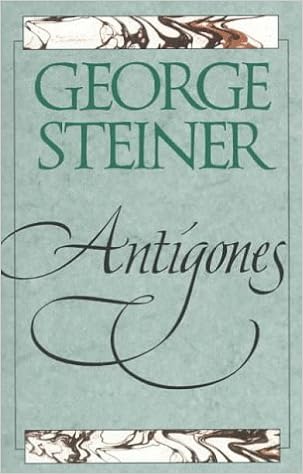
So Saturday I have a gig with my friend and colleague Amy Hertel Piersma. She booked it for us. For $250 a piece we will play for two hours. It’s a surprise 50th Anniversary party in a home. The people putting it on requested a mix of classical and jazz. We have developed a pretty cool play list including some pieces she and I play very well: a Mozart violin sonata movement and two movements of an incredible CPE Bach violin sonata. In addition to this we have added some lovely Loillet and Telemann. Amy is making a little collection of Jazz tunes she recognizes in my Real Books for both of us. This will be fun two hours for me.
I sometimes let the library set my reading patterns, putting books that I have checked out higher on my daily reading list than books I own. Consequently, I have been working on the following two books.

Bernard Knox has called George Steiner’s book, Antigones: How the Antigone Legend has Endured in Western Literature, Art, and Thought “a profound analytical discussion of the impact of [Antigone] … on the modern consciousness.” That was good enough for me to want to examine it. Now I’m reading it in earnest. Steiner delves deeply into areas that interest me like philosophy (Hegel) and Romantic poets (Byron) and there understanding of “Antigone.”
The book is full of thought provoking sentences like “The coordinates of Idealism are exile and attempted homecoming.” I think of myself as a life long outsider which is a kind of exile. Steiner is speaking in a strict sense about Idealism in terms of philosophical discipline, but it still causes an echo in my little pea brain when he says later “self-exile seems implicit in the life of consciousnesss, in the capacities of the human ego to think ‘outside’ and ‘against’ itself.” This observation rings throughout my own consciousness. I see myself as someone who often embraces his own struggle.

The other library book I am madly reading is Tragedy and Farce: How the American Media sell Wars, Spin Elections, and Destroy America. If you read this blog with any regularity and attention you know that co-author of this book, Robert W. McChesney, is on my intellectual radar these days as I think about our political system and media. I am reading an ebook copy of his book, Blowing the Roof Off the Twenty First Century: Media, Politics and the Struggle for Post-Capital Democracy. In it, he mentioned Tragedy and Farce as important reading to understand his ideas.
I had already checked this book out and was reading the illuminating chapter on the November Presidential Election of 2004. (Did you know that GW Bush was caught using an ear piece feeding him answers in the debates that year? The New York Times killed the story just before the election that year as at the same time the right crescendoed the hideous Swift Boat lies about candidate Kerry) McChesney’s mention of his own book motivated me to return to the beginning of Tragedy and Farce to see what else he has to say.
Bernie Sanders and Hillary Clinton Turn to Attacks on Credentials – The New York Times
This is a troubling turn of events in the Democratic presidential primaries. I have been trying to understand it. I have a suspicion that Sanders and/or his campaign might have been reacting as much to the following Washington Post headline as to anything Clinton actually said.
Clinton questions whether Sanders is qualified to be president – The Washington Post
It looks like the Post definitely goaded on this misstep by the Sanders campaign. What a mess.
For the recording, I think both candidates are as qualified to be president as any candidate on the horizon.
How a Cryptic Message, ‘Interested in Data?,’ Led to the Panama Papers – The New York Times
In another little journalistic observation, I have to admit that this story ran the same day as some other reports from the NYT about this whole dealy which I criticized for not mentioning the origin of the story. This report about the way the story broke still fails to give a clear picture of the innovative journalism of the International Consortium of Investigative Journalists. Their use of Facebooger-like software came to mind when I read the next story:
Italians, Helped by an App, Translate the Talmud – The New York Times
One thing I learned in this story is the original Talmud was wriiten in both Hebrew and Aramaic. Since Jesus supposedly spoke Aramaic and Greek I have a tendency to think of the latter as a more vernacular language. I guess I was wrong.